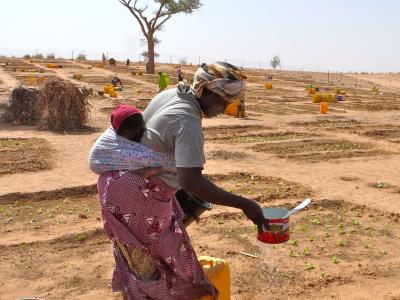More than 30 countries lay the groundwork for the NAP process with support from NAP-GSP
Submitted by esther.lake@undp.org on 17 May 2017

17 May 2017, Bangkok, Thailand: NAP support is being provided by the joint UNDP - UN Environment National Adaptation Plan Global Support Programme (NAP-GSP) to more than 30 countries, on an ongoing basis, in Africa, Asia and Eastern Europe – including assistance with stakeholder consultation, stocktaking, NAP roadmap formulation, sectoral prioritisation and cost-benefit analysis, amongst other forms of support.
NAP-GSP has provided support to Least Developed Countries (LDCs) since 2013, and now supports more than 16 LDCs in Africa, Asia and the Pacific. The one-on-one country support is provided by UNDP, through the NAP-GSP, and is customised to the country context, targeting specific aspects of NAP as identified by the countries, including stocktaking, technical assistance, capacity building and knowledge sharing.
In Bangladesh, NAP-GSP has supported a national NAP road map, developed in coordination with a team of national experts in collaboration with the Ministry of Environment. In Cambodia, NAP-GSP assisted the Climate Change Department with stocktaking and NAP road-map formulation. The results have subsequently been incorporated into the Cambodia Climate Change Alliance work plan.
Comoros, Democratic Republic of Congo, Djibouti, Gambia, Liberia, Madagascar and Mauritania have seen the launch of their NAPs with NAP-GSP support - bringing together their Ministries of Environment and Planning as well as climate-sensitive sectors such as agriculture, health and water.
In Malawi, a NAP-GSP-supported NAP launch was followed by a detailed stocktaking exercise, undertaken in cooperation with the National Climate Change Programmes, to inform the process, progress and entry points for the Malawi NAP. Niger has identified key support requirements to advance their NAP, with the assistance of NAP-GSP. The focus is on skills development, institutional capacity building, and strengthening coordination and mainstreaming of adaptation. In Tanzania, NAP- GSP is providing support to the health sector to assist in a stocktaking exercise, whilst in Senegal NAP- GSP is assisting with consultations with the fisheries departments, to commence the NAP process at the sector level.
The NAP-GSP is also supporting more than 30 developing countries to advance their NAP process, providing one-one-one support from UNDP. Some key successes include assistance to countries in prioritising their adaptation options. For example, a Cost-benefit Analysis (CbA) Training Workshop was held for Ghana, which delivered a strong theoretical understanding of CbA as well as practical CbA applications in climate change adaptation. NAP-GSP has undertaken stocktaking assessments to identify the key actions and financial needs to mainstream CCA, in Bosnia and Herzegovena, Honduras, Pakistan, Zimbabwe, Khazakhstan, Uzbekistan, Armenia, Equador, Lebanon, Serbia, amongst other countries.
UNDP, through the NAP-GSP, also supports countries to integrate climate change into development plans and budgets, and has supported mainstreaming CCA through NAP development in Kazakhstan and Uzbekistan. NAP-GSP continues to work with developing country governments to formulate NAP roadmaps and work-plans. Examples include Georgia and Uruguay, where programme facilitation and support included NAP Orientation Workshops for national stakeholders, followed by direct one-on-one meetings and consultations.
Together, these activities are laying the groundwork for the development of effective NAPs across the globe, and helping countries to prepare to access much-needed financing for climate change adaptation.